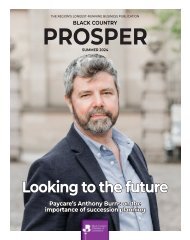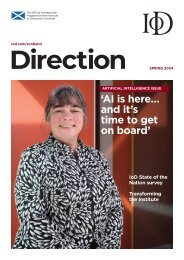IoD Scotland Autumn 2021
Institute of Directors Scotland, business magazine, directors
Institute of Directors Scotland, business magazine, directors
Create successful ePaper yourself
Turn your PDF publications into a flip-book with our unique Google optimized e-Paper software.
Developing teams capable of<br />
sustained success<br />
There’s a great deal the business world can learn from the sporting arena,<br />
says Peter Ross, associate partner with Ogilvie Ross LLP<br />
When I first started<br />
coaching in a team sports<br />
environment, I naively<br />
thought that the success<br />
of teams was a result of<br />
having talented individuals with superior<br />
skills. I focused my time on developing<br />
game-specific skills, hoping that<br />
improved performances would come as<br />
a result.<br />
After my first year in charge of<br />
that team, and having won only three<br />
games all season, I was forced to rethink<br />
my philosophy and improve my<br />
understanding of what facilitates team<br />
and individual performance.<br />
Seven years later and I have overseen<br />
my most successful coaching season yet.<br />
Heriot’s Cricket Club – where I fulfil the<br />
role of Director of Cricket – has won the<br />
domestic double of the Scottish Cup and<br />
the Eastern Premier League to become<br />
the best team in <strong>Scotland</strong>. Add to that:<br />
an unbeaten season in 2020; Scottish<br />
Cup Champions in 2019; National T20<br />
Champions in 2018; and Eastern Premier<br />
League Champions in 2017 – and there<br />
has been a sustained period of success<br />
over the past five years.<br />
Additionally, Carlton CC Women –<br />
where I took over as Head Coach at<br />
the start of this season – have won<br />
the domestic double in the women’s<br />
competitions. Players who had previously<br />
been underperforming more than<br />
doubled their output this season to put<br />
in match-winning contributions. This was<br />
mirrored in the Cricket <strong>Scotland</strong> female<br />
regional programme where, in my role of<br />
Lead Coach, I oversaw a change in the<br />
style and brand of play, leading to better<br />
individual and team performances, which<br />
ultimately contributed to the <strong>Scotland</strong><br />
Women’s team becoming European<br />
Champions.<br />
So, what has changed? Was my initial<br />
belief about team success relying on the<br />
skill and talent of each individual, wrong?<br />
Not wrong, if anything just incomplete.<br />
Highly skilled and talented individuals<br />
are a definite asset to any team.<br />
However, my experiences over the past<br />
seven years have taught me that great<br />
teams are more than the sum of all their<br />
parts. Great teams understand and buy<br />
into a higher purpose, they are filled<br />
with individuals who are clear on their<br />
Peter calls<br />
the shots<br />
in a more<br />
traditional<br />
sports<br />
coaching role<br />
strengths and who understand the roles<br />
they are required to fulfil. If you get the<br />
right people in the right positions, with<br />
everyone moving forwards in the same<br />
direction towards a shared goal, amazing<br />
things can happen.<br />
After that first year of coaching at<br />
Heriot’s CC, I changed my approach.<br />
I still spent time developing players’<br />
skill levels, and through experience was<br />
able to refine what skills we needed<br />
to achieve success. However, I started<br />
to put considerably more effort into<br />
developing people and creating a<br />
sustainable environment for success.<br />
I now spend more of my “coaching”<br />
time working on player-management,<br />
helping individuals to understand<br />
themselves and trying to develop<br />
positive relationships where the players<br />
start to see how they fit in to the big<br />
‘‘<br />
If you get the right<br />
people in the right<br />
positions, with everyone<br />
moving forwards in the<br />
same direction towards<br />
a shared goal, amazing<br />
things can happen.<br />
picture. We spent deliberate time at<br />
Heriot’s talking about what we were<br />
trying to achieve and were prepared to<br />
have open and honest conversations<br />
about whether what we were doing was<br />
helping us move towards our ambitions.<br />
Not all the discussions were easy but<br />
being able to have difficult conversations<br />
in a constructive fashion is an essential<br />
trait of high-performing teams.<br />
Positively negotiating challenge<br />
also creates an environment of trust. If<br />
people feel valued and supported, and<br />
they know that they have the backing of<br />
the team even if they make a mistake,<br />
they are more likely to take risks, take<br />
responsibility, and perform when they<br />
need to. Ultimately, this creates a group<br />
of leaders who are prepared to take<br />
initiative in key moments.<br />
While my experience has come in a<br />
sporting context, most of these concepts<br />
about developing successful teams can<br />
be applied across the board in other<br />
domains. Investing time and energy<br />
to develop and put the team first can<br />
ultimately lead to consistently great<br />
outcomes and a future of sustained<br />
success.<br />
Peter Ross is an award-winning<br />
international sports coach and<br />
associate partner with Ogilvie Ross LLP<br />
For more information see<br />
www.ogilvieross.co.uk<br />
<strong>Autumn</strong> <strong>2021</strong><br />
iod.com<br />
19

















